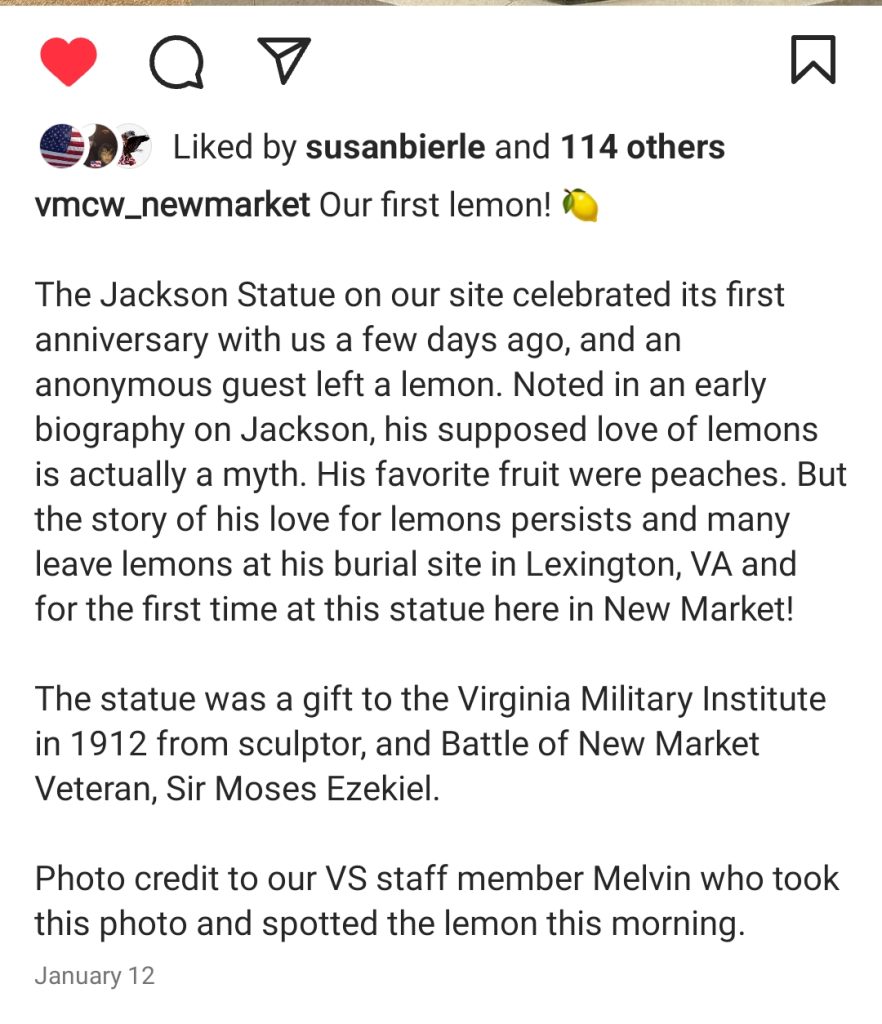Public History Notes: Lemons & The Jackson Statue at New Market
Last week Virginia Museum of the Civil War at New Market Battlefield State Historical Park made a social media post announcing their “first lemon.” Some unknown admirer or perhaps prankster had laid the bright yellow citrus at the base of the Ezekiel statue of General “Stonewall” Jackson, recently relocated from Virginia Military Institute to New Market battlefield.
It’s a Stonewall thing, I thought, as I double-tapped the image to give it a like on Instagram, half-grinning and half-shrugging. A couple days later I happened to be at the battlefield and saw the lemon for myself, though I forgot to take a photo as I scurried between research appointments. Driving down the Valley Pike though, I couldn’t get the lemon out of my mind. Is there a “deeper meaning” and something positive to be seen in the arrival of this “first lemon”?
Thanks to some earlier biographers, Henry K. Douglas, and a few other writers, Thomas J. Jackson has long been associated with lemons; other biographers tried to counter the story, pointing out that Jackson liked many fresh fruits and was especially fond of peaches. However, lemons fit the “strange stories of Jackson” narratives and continued to be popular. For example, Douglas, who could spin a good tale, is not always acknowledged for his accuracy in his post-war memoirs gave this version in his book I Rode With Stonewall:
[On June 27, 1862, during the battle of Gaines Mill] General Jackson mounted…and leaving his position moved more to the front. At that moment someone handed him a lemon – a fruit of which he was especially fond. Immediately a small piece was bitten out of it and slowly and unsparingly he began to extract the flavor and its juice. From that moment until darkness ended the battle, that lemon scarcely left his lips except to used as a baton to emphasize an order. He listened to Yankee shout or Rebel yell, to the sound of musketry advancing or receding, to all the signs of promise or apprehension, but he never for an instant lost his interest in that lemon and even spoke of its excellence. His face, nevertheless, was calm and granite-like. His blue eye was restful and cold, except when now and then it gave, for a moment, an ominous flash. His right hand lay open and flat on his thigh, but now and then was raised into the air as was his habit…. But the lemon was not abandoned.
There may certainly be some truth to the account about that battle day at Gaines Mill, but this thread of the story along with a few other random references to lemons or lemonade sparked an enthusiasm for Jackson and lemons in post-war writings that rapidly spun out of context. It became a favored story/myth about Stonewall’s eccentricities. As the tales evolved, Jackson won battles BECAUSE he devoured lemons…at least implied in some stories for young readers…written by adults.
I don’t begrudge anyone their enthusiasm for Jackson and lemons; it can make special memories for those who do it. (While I haven’t left lemons, I do have a good memory involving purposely eating peaches at Antietam linked to a lesser-known Jackson account!) It seems like a long standing tradition to leave lemons at Jackson’s grave in Lexington, Virginia, at the Guinea Station death site, or other Stonewall locations. And, I do think it represents one of the unique ways to engage with the past.
The lemons may symbolize the stories of Jackson. Stories often started with a primary source account and then expanded over time to encompass more virtues or eccentricities. (It happens with other historical persona “fan clubs” too. I’m always intrigued by what can be found at the base of statues, particularly at Gettysburg!) Stories are part of human existence, but the stories that are repeatedly told in a culture both become part of that culture and say something about it, too.
When doing public history, how can we take the story, recognize its importance, and use it as a starting place for longer and larger conversation? I keep thinking about that…and not just in the Jackson vs. Lemons context.
The arrival of the Jackson lemon at New Market reminds me that “Stonewall” continues to hold a large place in Civil War stories and memory. (Not a bad thing.) But where from here? How do we explain that Jackson was not always beloved, that he had bad battle days along with his victory days, and other realities? How do we separate the man from the myth – not to unfairly denigrate him – but to try to understand the human choices that he made and represented? Humanize the hero…and he’s often more intriguing and complicated.
Lemons may represent that opportunity. Maybe at the base of Jackson monuments, they are reminders that this guy – now represented in bronze – once lived and liked a sour fruit on a particular battle day. While the lemons themselves have become part of the legend, maybe they symbolize that someone is trying to remember the human side of their hero…even if that human side has a strong hint mythology. What a twist of historiography and stories!
Stonewall’s birthday anniversary is tomorrow (January 21), and I’m sure more fresh lemons will be appearing at the bases of remaining or relocated statues. Whether you love or hate the Jackson lemons, I think we have to admit that it’s a sign. A sign that people are still curious about the past and that stories – whether completely true or a bit legendary – still capture interest and prompt actions. That’s positive. That’s an opportunity for public history.
There are a few options when life gives lemons. (I still prefer to keep them and make lemonade.) At historical sites or statues, they give a hint of two things: there are more primary sources that need to be brought into discussion and people are interested!
Oh, and another option with life’s lemons…
Many soldiers in Jackson’s command marching through New Market in 1862 probably would’ve preferred Grumpy Cat’s option. How stories must change when confronted with the real-time primary sources. And that’s not a bad thing either, though some may find this option a bit sour at first.




Thank G-d it wasn’t defaced.
Based upon Bud Robertson’s biography of Stonewall, we know that he spent a hitch in Florida prior to resigning from the U.S. Army. So it follows that he surely became acquainted with this tart citrus fruit during that assignment, if not before. In addition, lemons as well as other citrus fruits were known to ward off the symptoms of scurvy, and Jackson, as a military officer, would have certainly been privy to that knowledge. Given his eccentricities, it’s surely reasonable that he would relish a lemon or an orange on the rare occasion when one was available.
The 12th Georgia Regiment from Sumter County (think Americus & Jimmy Carter) was part of Jackson’s command. Based upon diary references, those Georgia volunteers regularly received food and clothing packages from home. Since the tough hides on lemons protect the fruit from spoilage, it’s reasonable to assume that they might have been part of every package sent from home. I’ll surmise that Stonewall would surely relish an occasional lemon, complements of the volunteers from those southern-most states.
I visited the SW Jackson house in Lexington this past summer. I bought a styrofoam strressball shaped like a lemon.
As James I. Robertson Jr. pointed out in his seminal biography of Jackson, it is not a ‘myth’ to state that Jackson consumed and enjoyed lemons. There is more than enough credible evidence to substantiate that it is accurate to say he consumed and enjoyed them.
This has to be seen in the wider context, not isolated story, of his fervent relish of ALL fresh fruit. One of Jackson’s few earthly passions he gave vent to was his utter love of fresh fruit of any description, (when stationed in Mexico in the MA War from 1846-48, the availability of so many tropical fruits was a joy of his life, which he retained to the end of his life).
So there is truth to the lemons account, but it has been embellished into being a veritable ‘Popeye and Spinach’ relationship. It isn’t a myth.